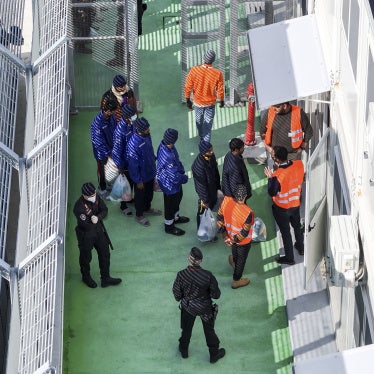Published in
European Voice
Many, if not most, of the European leaders meeting in Lahti tomorrow (20 October) are keen to ‘externalise’ the management of asylum-seekers and migrants.
The most contentious formulation – the idea of ‘offshore’ processing in EU-run facilities – may have been dropped.
But the EU still looks to transit countries such as Ukraine and Libya, as well as countries of origin, to take on the job of stopping, hosting and processing migrants and asylum-seekers before they reach EU territory.
The EU goal of addressing asylum “as close to home as possible” (as the European Commission’s communication on regional protection programmes put it) has worrying implications. Countries that the EU is cultivating as partners may simply not be up to the task – and sometimes demonstrably are not.
Ukraine exemplifies the difficulties. In its European Neighbourhood Policy partnership, the EU has prioritised co-operation on re-admission, migration and border management.
Given the importance of its relationship with the EU, Ukraine has a strong incentive to co-operate on migration management on the EU’s terms. But it lacks much of the necessary legal and policy framework and the sheer capacity to provide protection to refugees, process asylum-seekers’ requests, or respect the rights of migrants.
EU criteria for co-operation may exacerbate Ukraine’s already poor record on the treatment of migrants, access to asylum and protection against return to persecution or torture.
Both the EU and the partner state are obligated to comply with international standards for respecting the human rights of migrants and asylum-seekers. If the Union is to insist that other states respect these obligations, EU member states themselves must first set a good example by ensuring that their policies fully comply with human rights and refugee law.
Unfortunately, neighbouring states may also emulate the worst of EU internal approaches towards migration and asylum, such as detention and expulsion without adequate safeguards.
The Council of Ministers should reaffirm the EU commitment to its own obligations to protect asylum-seekers and migrants inside the territory of member states. And the EU should leverage its relationships with neighbouring countries to seek improvements in protection for migrants and asylum-seekers within those countries.
Regional protection programmes are the one aspect of current EU migration and asylum policy that merits cautious optimism. Through these programmes, the Commission aims to enhance the protection capacity for regions of origin through a co-ordinated approach, including general development and humanitarian assistance, and to improve access to durable solutions in the target countries.
Whether these programmes will boost protection of migrants and asylum-seekers in Europe and beyond, or instead become a pretext for EU states prematurely to declare countries ‘safe’ and deny access to asylum and to return those at risk, will be a test of the EU’s commitment to its obligations toward refugees and others in need of protection.
Ian Gorvin is the author of a new Human Rights Watch briefing paper on the external dimension of EU migration policy.








